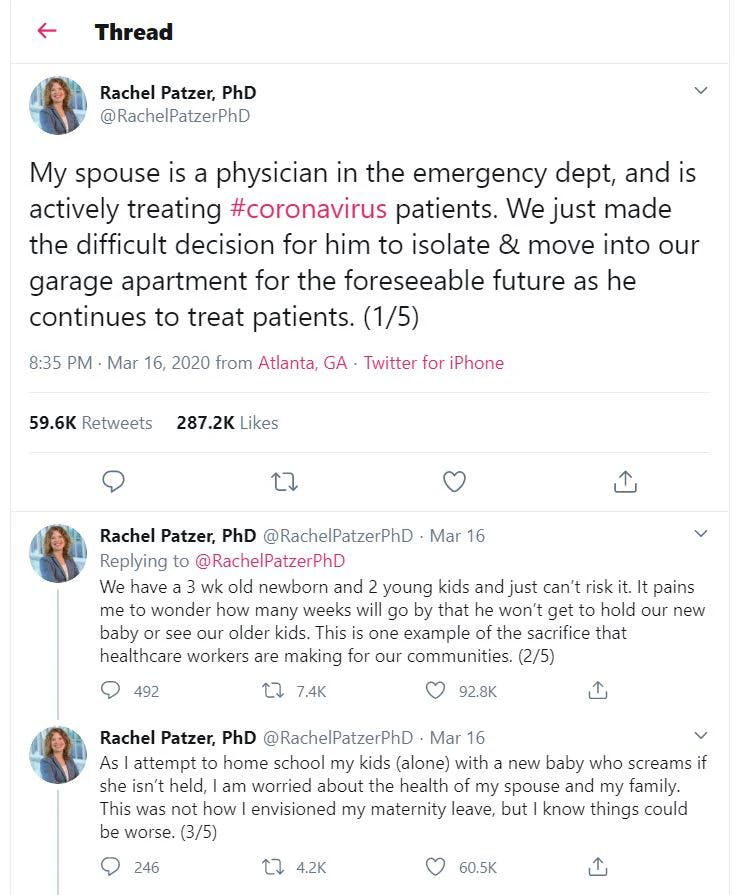The Coronavirus Is A Disaster For Everyone But Feminists Are Trying To Make It About Themselves
During this time of crisis, it's been amazing to see everyone coming together to support each other against COVID-19. But, of course, there are still those who are sowing the seeds of conflict — and feminists seem to be at the forefront.

I recently came across an article in The Atlantic titled, “The Coronavirus Is A Disaster for Feminism.” Written by Helen Lewis, a London-based staff writer for the publication, the piece argues that women are the real victims of this pandemic.
Devoting one single line to the fact that men are dying at higher rates than women (“Purely as a physical illness, the coronavirus appears to affect women less severely”), and barely accepting that as true, the rest of the article continues to say that women are essentially going to have to return to traditional gender roles, as well as lose out on healthcare because resources are being directed elsewhere.
Of course, Lewis draws a picture of a world returned to the dark ages, though to many of us, traditional gender roles are still our reality and our choice. But the question remains: Why continue to divide people when we should be in this together?
Caring for People Isn’t a Burden
Lewis’ argument is consistently undermined by her writing’s disdain for family and children. “The coronavirus smashes up the bargain that so many dual-earner couples have made in the developed world: We can both work, because someone else is looking after our children. Instead, couples will have to decide which one of them takes the hit,” she writes.
I’m sorry your job might need to be put on pause while you care for your family and friends – but what are your priorities?
I have no issue with women choosing to work, but saying that many couples each choose to enter the workforce while someone else deals with their children, that someone “takes the hit” because taking care of children is such a burden, makes the rest of her argument feel shallow. Or, at the very least, unrelatable. Having children does reduce independence – but in its place are the love and devotion a woman gains as a mother. Though a woman’s career can be fulfilling and meaningful, in treating children like a problematic distraction, Lewis forgets that most women find them the missing piece in their ultimate purpose.
Lewis continues, “What do pandemic patients need? Looking after. What do self-isolating older people need? Looking after. What do children kept home from school need? Looking after.” The callous way Lewis chooses to represent the care that sick and elderly people need, as if it’s yet another impediment towards women’s ambitions in the workplace (where they find their “true” purpose and meaning), again makes her argument questionable. Does she even care about the people who need looking after? I’m sorry your job might need to be put on pause while you care for your family and friends – but what are your priorities?
We All Have To Make Sacrifices
After stating that, “According to the British government’s figures, 40 percent of employed women work part-time, compared with only 13 percent of men,” she laments that many women will have to give up their jobs while their partners, who are the primary breadwinners of the household, get to continue working. And when women leave their part-time jobs, they have to take care of their families full-time.
Dividing labor and working as a team is what marriage is about.
Dividing labor and working as a team is what marriage is about. During this time of hardship, the responsibilities might look different than what a couple is used to. But whatever that division is – whether it is both spouses work and take shifts, or one works and the other cares for the children – the unusual stresses of this pandemic have to be taken into account. Indeed, many men are continuing to go to their places of work to support their families and risk contracting Coronavirus in the process. This is a time when sacrifices have to be made. This is a time when people are simply trying to survive by the best means they can.
Lewis quotes a viral tweet from an epidemiologist named Rachel Patzer to highlight the unique plight of women during Coronavirus: “My spouse is a physician in the emergency dept, and is actively treating #coronavirus patients. We just made the difficult decision for him to isolate & move into our garage apartment for the foreseeable future as he continues to treat patients. As I attempt to homeschool my kids (alone) with a new baby who screams if she isn’t held, I am worried about the health of my spouse and my family.”

In quoting her, Lewis seems to be demanding that we pity the wife for suffering disproportionately to her husband, who is now alone for weeks on end, removed from the entirety of his family as he fights on the front lines of this deadly disease that also kills men in greater numbers. And yet, Lewis seems to imply, this is a time for us to focus on the sexism of it all.
Domestic Abuse Rates Are Higher
Lewis’ fears of rising domestic abuse is fair: “In both rich and poor countries, campaigners expect domestic-violence rates to rise during lockdown periods. Stress, alcohol consumption, and financial difficulties are all considered triggers for violence in the home, and the quarantine measures being imposed around the world will increase all three.”
This is a truly scary reality of social-distancing and quarantine, and linked here are some resources if you’re in a situation like this one. Lewis could have focused on practical issues like this that really do affect women disproportionately rather than trying to overinterpret the reality of our current difficult circumstances.
The Medical Community Is Trying To Save Us All
Lewis then focuses on the limited resources that are being allocated for pregnant women during this pandemic and quotes Clare Wenham, an assistant professor of global-health policy at the London School of Economics, regarding the Ebola epidemic in West Africa: “And more women died in childbirth because resources were diverted elsewhere. ‘There’s a distortion of health systems, everything goes towards the outbreak,’ said Wenham, who traveled to West Africa as a researcher during the Ebola crisis.”
Lewis continually tries to make the connection between the outbreak of Ebola in third-world countries and the Coronavirus pandemic. Trying to compare a third-world country’s response to the U.S. and Britain during an entirely different disease is a rhetorical sleight of hand and unlikely to be equivalent.
Resources are being limited for everyone, men and women alike.
Outside of that, let’s take into consideration that resources are being limited for everyone, men and women alike. Also, focusing resources on fighting the Coronavirus is for the sake of saving as many people’s lives as possible, including elderly women and young women! Instead of blaming the medical community for trying to stop the spread of a virus that we don’t have immunizations for, maybe Lewis should show some appreciation for their efforts.
Of course, seeing the toll that the Coronavirus is taking on childbearing women is not easy. I have friends who have given birth without their husbands by their side or who are attending their ultrasounds alone to minimize the number of people in doctor’s offices. What should be the most exciting time in a woman’s life is now surrounded by caution. But again, these measures are in place for a reason – and the choices that are being made are not men versus women, but rather humanity against disease.
Closing Thoughts
The majority of women don’t call themselves feminists, and Helen Lewis’s piece is one reason why. If feminism were truly about equal rights for women, then it would be a different story. But Lewis is arguing for something different. She is arguing for who gets to be more of a victim – and chooses to ignore that the Coronavirus has uniquely targeted men, not women. Additionally, her callousness toward caring for children, the ill, and the elderly render her arguments selfish, not caringly laid out. Now, during this time of struggle, is when we should be coming together, men and women, and fighting for the best outcomes – for all of us.
Abby Roth is the creator of Classically Abby, an opera, beauty, fashion, and lifestyle brand dedicated to looking at the world from a classic perspective. Abby is an opera singer with three degrees in operatic performance from USC and Manhattan School of Music. She has performed all over at companies including Opera Omaha, Opera Maine, and Aspen Music Festival. You can find her website at www.classicallyabby.com and follow her on YouTube, Instagram, Twitter, and Pinterest at @ClassicallyAbby.